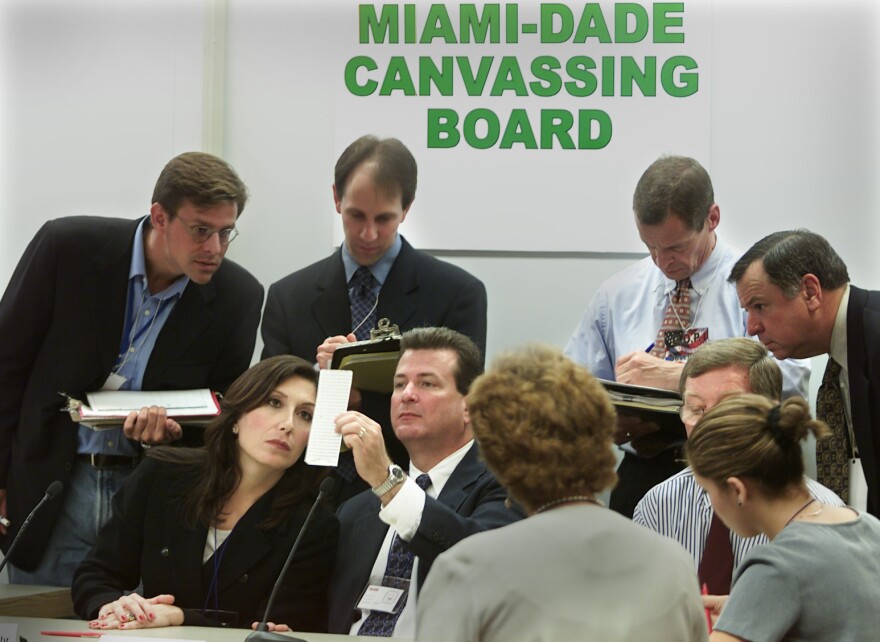The 2000 presidential election between George W Bush and Al Gore was the closest election in modern history with the results hinging on voters in South Florida. The new film “537 Votes” from director Billy Corben of Rakontur Films ties together several stories in the year leading up to the November election, and the aftermath, shining light on events that impact Florida politics to this day.
Corben spoke with Luis Hernandez on Sundial about how the story of Elian Gonzalez, the infamous “hanging chads” on dis-counted ballots and the campaign against the voter recount in Miami-Dade all impacted the results of the 2000 election.
WLRN is committed to providing South Florida with trusted news and information. In these uncertain times, our mission is more vital than ever. Your support makes it possible. Please donate today. Thank you.
"537 Votes" premieres on HBO Wednesday night at 9 p.m. and will be available for streaming on HBO Max.
Below is an excerpt of the conversation between Corben and Hernandez. The answers have been edited for clarity.
WLRN: Could you grasp at the time everything that was going on in Miami? Did you know that the epicenter of this whole thing that would change the world, not just the country, was Miami?
BILLY CORBEN: We were acutely aware of when we were living history, and this was certainly one of those moments. We remember that election night. Anchors were calling at one point Florida goes to Gore, then it's undecided. Then it goes to Bush. But no, we're not decided. It goes into the middle of the night. As Fernand Amandi says in the film, the election was lost in many places, but it was stolen in Miami. There was a decision made pretty early on by both campaigns that Miami-Dade County was going to be really the frontline in the war, in the war for the presidency, which Roger Stone refers to as "a street brawl for the presidency of the United States," the 2000 Florida recount.
What were the Republican's operatives doing in the weeks after the Presidential election?
They decided that the line was going to be drawn right here in Miami-Dade. It was one of the biggest and bluest counties. It was the most likely place that Al Gore could make up the five hundred and thirty seven vote deficit that he had.
The Republicans decided the first thing we're gonna do is declare victory because we were in the lead right now. So let's declare victory. George W. Bush is going to start putting together a cabinet and behave as though we're governing. And then everything that the Democrats do looks like they're on the defensive. They're trying to steal the victory away. They started labeling it, you know, a revolution like Fidel Castro is. You know, the Democrats are trying to come in and it's a coup, is what it is.

And that was really how they generated some enthusiasm and mobilized protesters to the government center. But more importantly, they were not going to leave anything to chance. The Republicans decided that they were going to effectively stage a rather violent protest right in the canvassing board office in government center in downtown Miami.
One of the chants during the so-called "Brooks Brothers riot," a demonstration that effectively ended the recount in Miami-Dade County, which was the beginning of the end of the 2000 election. They were chanting voter fraud. They were essentially calling the counting of legitimate ballots an election fraud. We used to call that democracy, but the Republicans were calling it fraud. And it's that same thing that is happening now.
Billy, do you think that this could happen again today? We supposedly upgraded the technology in Broward, Palm Beach County, Miami-Dade. We've got record numbers of early voting already. Do you have confidence that we won't have this happen again?
Well, the question is, how many places is it going to happen? How many Brooks Brothers riots will there be? How many Florida's will there be? You know, how many states will we have narrow margins in contested elections? That's the reality, though, about Florida, is that the elections are inexplicably and perpetually determined in the margins. It's like a Miami Hurricanes — FSU football game. It doesn't matter how good or bad one side is, they're always decided by like a field goal.
Let me finish with this. You have a whole generation of voters who either were very young or were not there when the 2000 election happened. I'm wondering how could this film help shape their understanding of everything that they see and hear happening now?
Vote, please. And that was really the inspiration for this, was to create a kind of mobilizing tool, a bipartisan one at that, just encouraging people to participate in their democracy.
We were talking to our assistant at the time who was born in 1990, so she was 10 years old during the Florida recount in 2000.
We said, “What do you remember, if anything, about the Florida recount?” And she shrugged sheepishly and said, “Hanging chads? Was that a thing?”
So we wondered how many Americans who would be theoretically eligible to vote either were too young to remember this or weren't even born yet when the 2000 presidential election came out. Fifty four million Americans were born between 1990 and 2002, and don't know that the fate of the free world hung on 537 votes in Miami.
And so, if 537 people in Miami can impact an entire national election, certainly 54 million Americans born between 1990 and 2002 can. So I hope they see this documentary. And I hope, as Mitchell Berger says, "you have to take the time to vote."






